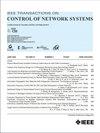Opinion Dynamics for Utility Maximizing Agents: Exploring the Impact of the Resource Penalty
IF 4
3区 计算机科学
Q2 AUTOMATION & CONTROL SYSTEMS
引用次数: 0
Abstract
We propose a continuous-time nonlinear model of opinion dynamics with utility-maximizing agents connected via a social influence network. A distinguishing feature of the proposed model is the inclusion of an opinion-dependent resource-penalty term in the utilities, which limits the agents from holding opinions of large magnitude. This model is applicable in scenarios where the opinions pertain to the usage of resources, such as money, time, computational resources, etc. Each agent myopically seeks to maximize its utility by revising its opinion in the gradient ascent direction of its utility function, thus leading to the proposed opinion dynamics. We show that for any arbitrary social influence network, opinions are ultimately bounded. For networks with效用最大化主体的意见动态:探索资源惩罚的影响
我们提出了一个连续时间非线性的意见动态模型,其中效用最大化的主体通过社会影响网络连接。该模型的一个显著特征是在效用中包含了一个依赖于意见的资源惩罚项,这限制了代理持有大量意见。该模型适用于意见与资源使用有关的场景,如金钱、时间、计算资源等。每个智能体通过在其效用函数的梯度上升方向上修正其意见,短视地寻求其效用最大化,从而导致所提出的意见动态。我们表明,对于任何任意的社会影响网络,意见最终都是有限的。对于具有弱对抗关系的网络,我们利用收缩理论证明了网络存在全局指数稳定平衡点。我们建立了共识均衡存在的条件,并分析了在共识下主体的相对优势。我们还对潜在的意见形成博弈进行了博弈论分析,包括纳什均衡和满意度比率方面的无政府状态价格。此外,我们还研究了在双智能体情况下意见的振荡行为。最后,模拟说明了我们的发现。
本文章由计算机程序翻译,如有差异,请以英文原文为准。
求助全文
约1分钟内获得全文
求助全文
来源期刊

IEEE Transactions on Control of Network Systems
Mathematics-Control and Optimization
CiteScore
7.80
自引率
7.10%
发文量
169
期刊介绍:
The IEEE Transactions on Control of Network Systems is committed to the timely publication of high-impact papers at the intersection of control systems and network science. In particular, the journal addresses research on the analysis, design and implementation of networked control systems, as well as control over networks. Relevant work includes the full spectrum from basic research on control systems to the design of engineering solutions for automatic control of, and over, networks. The topics covered by this journal include: Coordinated control and estimation over networks, Control and computation over sensor networks, Control under communication constraints, Control and performance analysis issues that arise in the dynamics of networks used in application areas such as communications, computers, transportation, manufacturing, Web ranking and aggregation, social networks, biology, power systems, economics, Synchronization of activities across a controlled network, Stability analysis of controlled networks, Analysis of networks as hybrid dynamical systems.
 求助内容:
求助内容: 应助结果提醒方式:
应助结果提醒方式:


